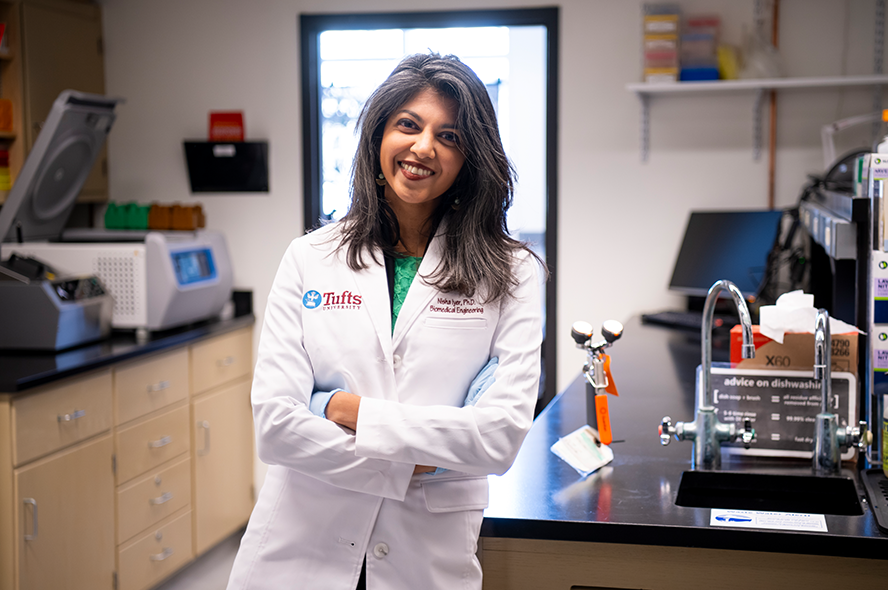Iyer recognized for innovative approach to pain research

Assistant Professor Nisha Iyer of the Department of Biomedical Engineering has been selected as a recipient of a Helping End Addiction Long-term (HEAL) New Innovator Award by the National Institute of Neurological Disorders and Stroke (NINDS), part of the National Institutes of Health (NIH). The HEAL program supports early-career investigators who have groundbreaking, creative research ideas related to pain, opioid use disorder, and/or overdose. This award of $2.3 million over three years will fund Iyer’s work on developing stem cell tools to create models for studying pain circuitry.
Deaths due to opioid use disorder have been on the rise in the US, with numbers rising from 49,860 in 2019 to 81,806 in 2022. Recognizing this disorder becoming an epidemic, the NIH HEAL Initiative seeks to accelerate scientific solutions by enhancing treatments for opioid misuse and improving pain management strategies. The development of new treatment strategies is made difficult by the extraordinary complexity of both pain and addiction, consisting of physical, emotional, and social components. That’s why the HEAL New Innovator Award specifically targets high-risk, high-reward research, supporting investigators with out-of-the-box ideas that have the potential to reshape approaches to complex biomedical challenges.
Most in vitro models for pain focus on just one cell type—sensory neurons in the peripheral nervous system that detect stimuli initially. However, pain, especially chronic pain, involves many other supportive and connecting cells in the central nervous system that play a role in how pain is processed and interpreted by the brain. These pain circuits also exist in different parts of the body and have region-specific identities, but current models can’t replicate that complexity.
Iyer’s award has three main goals: (1) to differentiate human stem cells to different sensory neurons and supportive cells from various parts of the body, which can be used for diverse tissue engineering applications; (2) to develop 3D somatosensory organoids that mimic the complex connections between the peripheral and central nervous systems; and (3) to integrate these 2D and 3D tools into tissue-engineered models used by colleagues in the Department of Biomedical Engineering. That collaborative work will explore how sensory neurons influence diseases like breast cancer metastasis (with Associate Professor Madeleine Oudin) and endometriosis (with Assistant Professor Juan Gnecco), as well as their connection to pain outcomes. Iyer’s efforts are crucial for creating more accurate models that can help us better understand basic pain transmission and potentially serve as drug screening platforms for non-opioid painkillers.
Iyer’s overall research interests lie at the intersection of developmental biology and regenerative medicine. Her lab uses tissue engineering and stem cell-based approaches to understand and repair the nervous system. By developing biomanufacturing strategies and enabling technologies, Iyer seeks to advance translational solutions and cell therapies for a wide range of neurological diseases. Her innovative approach to understanding complex neural networks exemplifies the transformative research supported by the NIH HEAL New Innovator Award. Through this award, Iyer will contribute to efforts to address patient-specific manifestations of pain, while advancing broader biomedical research applications.
The content of this article is solely the responsibility of the authors and does not necessarily represent the official views of the National Institute of Neurological Disorders and Stroke or the National Institutes of Health. Research reported in this article was supported by the National Institutes of Health under the following award number: 1DP2NS140734-01.
Department:
Biomedical Engineering